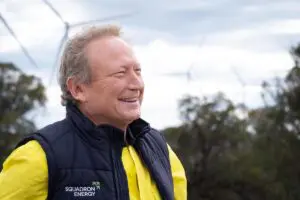Australia could reach 100 per cent renewables as early as 2040 by adding 1.9GW of solar PV and 1.9GW of wind power capacity a year, according to one of Australia’s top renewable energy experts.
Andrew Blakers, who is the director for Sustainable Energy Systems at the Australian National University, told the Australian Solar and Energy Storage conference in Melbourne that his conservative prediction was that Australia would reach 90 per cent renewables by 2040 – just through natural attrition.
But, he added, at the rate Australia was adding, and could add, solar and wind – nearly 1GW of solar was added to rooftops alone in 2014 – and factoring in the “natural attrition” of the nation’s fossil fuel power plants, this figure could easily reach 100 per cent.
“PV and wind could, essentially, do the whole lot fairly easily,” Blakers told the conference on Thursday. “There are no more economic constraints,” he said, with PV and wind now costing the same as new-build fossil fuels. The issue was ensuring that fossil fuel generators actually exited the market.
And as far as solar PV was concerned, Blakers said, the economics – and efficiency of the technology – would only get better.
Blakers – whose work in solar energy conversion led to the development of highly efficient PERC (passivated emitted and rear call) solar cells, which are expected to make up 40-50 per cent of total PV cell production by 2025 – said the cost of PV was expected to fall to 40c/W by 2025.
Cell efficiency, meanwhile, was expected to increase by between 20-26 per cent within the next 10 years, he said.
“The PV learning curve continues,” said Blakers, noting that the historical pattern has been that every time you double cumulative production of of solar panels, the cost comes down about 25 per cent.
“Wind and solar are fully competitive with fossil fuels, without a carbon price,” said Blakers on Thursday.
He said that solar PV and wind had reached a very important tipping point in Australia, where they had become the number one and two in new added power generation capacity.
“Renewables are well on track to push fossils fuels and nuclear out of the picture within the next 10-15 years,” he said.
In the Australian market, PV would kill the gas market “rather sooner” than it would kill the fossil-fuelled electricity market, he said, as hot water storage, heat pumps and batteries became significantly cheaper.
“The revolution will go far faster than most people think.”
On storage, Blakers – a long-time fan of pumped hydro storage – has a “different view of things”, and makes no mention of the much-hyped arrival of the Tesla battery product.
According to Blakers, most commercial-scale energy storage will be “off-river” pumped hydro – using off-the-shelf technology that would add only 1-2c/kWh to cost of PV.






